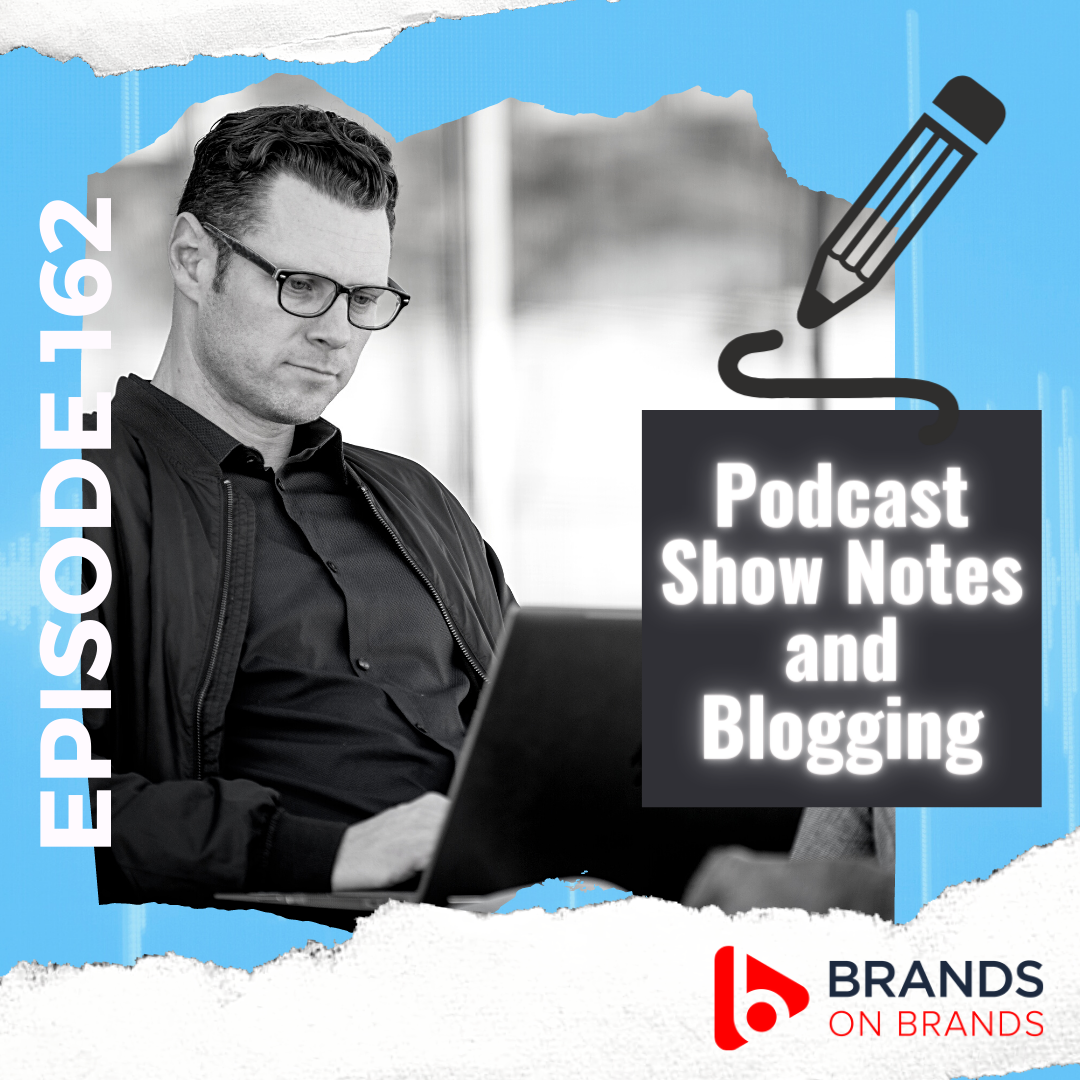Today we are talking about how to write podcast show notes as well as blogging for your podcast. Your podcast show notes provide the description of your episode, and that helps your listeners decide whether they should tune in or skip the episode.
REASONS TO WRITE PODCAST SHOW NOTES
Just by the notes and how you describe the show that you’re recording, your listeners are making a decision if this show is for them or not, or this episode is for them or not. Those words are important.
Also, the keywords you use help your episode get found. There are computers and algorithms that are written to scan the descriptions you’ve used to describe your episodes and episode titles. They figure out if someone is searching for this on the podcast player.
These decide if they should show listeners your show and episodes. They determine whether your show is generally about the topic listeners have typed in. You do have to be thinking about how you write these things.
I’d also like to say one of the biggest mistakes I’ve seen podcasters make consistently (especially when they’re starting out) is using their show notes as their blog. We’ll talk about why that matters.
RELATED: Learn how to convert one hour of content into one month of content at brandsonbrands.com/resources.
YOUR PODCAST SHOW NOTES MUST INCLUDE KEYWORDS
We’ll start with keywords. This is by far the most important of all of them. I think a lot of us understand keywords at a basic level, but we don’t really think about them all the time for every episode we create.
I think that’s a change we have to make in our mindset. Keywords should be included in the first sentence and repeated in the paragraphs of your show notes for every episode. Keywords are the main words and the main topic of that episode’s subject matter.
PICK YOUR KEYWORD AND USE IT FREQUENTLY
If you’re doing an episode about parenting, then the word “Parenting” should be in the episode title. It should be in the first sentence of the show notes, in terms of the description of what the episode’s about. It should be repeated a few other times in the description.
The reason is that if you’re having to explain that the show is about parenting, and you’re talking about different parenting topics, you’re going to use that word multiple times, right?

Keywords are important. I’m not saying over-stuff your descriptions with them. I’m saying that they should be used repeatedly in a way that makes sense and whatever seems to fit how you’re describing your show.
The reason that this matters is that when people type in the word “Parenting”, your show will pop up. That episode will pop up specifically, especially if it’s right there in the title and in the description subsequently. It helps your show get found.
KEYWORDS IN PODCAST SHOW NOTES GENERATE DISCOVERY
More importantly, it helps the audience know what this show is about. Every time someone searches for that, your show pops up. They choose it because the words are right there describing it in a way that tells them that this is the right show for them.
That also lets the computers and algorithms know that this show is the one that people are searching for. It continues to put you at the top as a relevant search result. Those keywords help your show get found.
The way you write those notes will start to translate into how your show gets found, not just in the podcast players. Later on, as you’re repurposing, it will help with how your show gets found in the search engines for your blog and on other channels if you end up repurposing to YouTube and places like that.
Think about your keywords upfront, because if you get it right the first time, then as you start to reiterate and change your content across different channels, it carries through. You don’t have to do it over and over again.
RELATED: Are you new to podcasting, or trying to make your current show better? Check out my 10 Podcasting Ideas for Beginners!
HOW TO FORMAT PODCAST SHOW NOTES
The next subject within podcast show notes and blogging is how do you format the actual show notes that you’re writing? What is the structure in the words of the paragraphs when you’re writing your show notes?
I’m going to give you the standard show notes. This is not to be confused with blogs. This is the thing that you’re actually typing into the description box on your podcast host, which is what shows up in the podcast player.
If you find an episode of mine in the podcast player, there’s going to be a small paragraph or two that describes just this episode. I put that on my hosting provider, Libsyn, where I enter all the details of my show. There is a section called “Show Description”, and this is where I enter the information that we’re about to talk about.
WHAT THE SHOW NOTES SHOULD CONTAIN
What I like to do is give a summary paragraph first. That summary paragraph is going to have the keywords that we talked about in the very first sentence. It says “Today’s show is about XYZ and here’s what you can expect in the show.”

Right under that, (it can be one or two paragraphs,) you want to get into your show highlights, which will be bullets, a couple of key points that are easy for people to skim through. That could be four or five moments in time within the show that gives people a feel for the topics.
You can summarize it, but giving a key point outside of the summary will be more specific about what they’re going to learn, what they’re going to hear, and memorable moments.
WRITE THINGS THAT ENTICE LISTENERS
All of those are going to entice them to want to listen to the show. Your job here in this description is to convince them that this show has exactly what they’re looking for. These bullets allow you to add a little bit more variety or specificity so that you might catch their attention and say, “This is the show for you.”
Below the bullets, the next thing you’re going to want to add is memorable quotes from the show. What do the memorable quotes do? Number one, you’re going to need quotes for social media later on.
Number two, as listeners see these things, maybe they’ll read one or two of them and they’ll have those impactful moments in a short form that they can digest. Maybe those quotes are the thing that captures their attention or draws them in.
APPEAL TO DIFFERENT KINDS OF LISTENERS
These are three different things drawing them into the show. There’s a point to that. Every one of these things is designed to give you a different chance to entice a person to listen.
The summary is for the people that just want to know what it’s about. The highlights are for the people that are looking for a little more detail. The quotes are for the people that are looking for something to pull them in emotionally. They’ve been moved by something in the quote.
All three of them are designed to bring people into the show because your goal is to get them to listen. At this point, they’re just scanning. You want to go from being a scanner to being a listener.
DON’T FORGET TO ADD LINKS TO YOUR PODCAST SHOW NOTES
After your quotes, now you get into adding a couple of guest links if you’re interviewing someone. Have somewhere to find the links from the guests that you’ve been interviewing, and then also your host links. If you don’t have a guest, you won’t need the guest links. You’ll just have host links.

If you have both, the host links are going to be what to do next. It’s going to be how to either contact you, how to download your freebie or how to continue listening or subscribing or following your show. Get your host links in there for every episode.
That’s the simple format for show notes. It’s very easy to follow, very easy to use and it’s a pretty common format for a lot of podcasters.
DETAILS TO CONSIDER FOR YOUR SUMMARY PARAGRAPH
Now I’m going to talk about that summary paragraph I mentioned earlier on. The summary paragraph is the first one or two paragraphs that start your show notes. Before you get into the highlights in bullet form, those summary paragraphs also can follow a pretty simple structure so you know how to do it every time.
Why is structure important? I’m hoping that even though you might be doing this when you’re getting started, at some point you can pass this on for someone else to do for you. You can hire a virtual assistant to help you create these things so that you’re not using your time to do it.
I know some of you are starting out and you’re doing a lot of this yourself. However, you can write all this down. Write your steps down so that you can pass them on to someone else to do when you are growing.
WHAT IS IN A PODCAST SHOW NOTES SUMMARY PARAGRAPH
What’s in a summary paragraph? In your first sentence, we mentioned it should have your keyword. It should be the main thesis of your show, the main takeaway described in a succinct way in one sentence. That should be the first part of your summary paragraph. It should definitely explain the main thesis of your show.
The next part in your summary paragraph should elaborate on that thesis by expanding on what else they’re going to hear or what that means. I like to think of it as three main topics being covered in your show. We have your main thesis. Then within that thesis, you have three main topics that are being covered.

It could be four, it could be two, it could be five. I like to aim for three because that’s how people remember things. If you could say, “Okay, today we’re covering X, Y, and Z,” then you’re pretty much covered.
EXAMPLES OF A SUMMARY PARAGRAPH
Take this as an example. Today’s show is about podcast show notes. I could say, “Hey, today we’re going to be talking about podcast show notes. The things you’re going to be hearing today in this show are how to format your show notes, how to summarize them, and how to convert them into a blog.”
Those are three things that I would call my main topics. I write it the same way I’m hoping to speak it when I’m introducing my show at the top of the show. What that does is if I introduce it that way consistently, now the person who’s writing my show notes doesn’t have to invent it from scratch.
They can actually take it from my own words that I use to describe it every time I start a show. That saves a little bit of time, especially if you’re using transcription to pull the words out. They can just copy the words from what you exactly said and type them into your show notes.
To summarize, your summary paragraph should include your main thesis of the show, three main topics being covered, and then why they should listen. In other words, you’ve explained that these are the things you’re talking about, but why are these things important? Why do they need to know them? Why is that information helpful to the person listening?
CHANGE YOUR STRUCTURE AS NEEDED
Lastly, if you do have a guest on the show, you should be including any guest’s information, any of their accolades, or why you invited them on the show. Their important accomplishments should be included in your summary paragraph as well.
Now, that might be the one thing that in some cases you can flip to the top of the show. If you need to move their guest information up higher, you might want your main thesis, then your guest information, and then your main topics.
You can play with that structure depending on what you think is going to entice more people to listen. Is it the topic or is it the guest? If it’s a big-name guest, then you may want to lead with that right at the beginning of your summary paragraph.
PODCAST SHOW NOTES VERSUS BLOGGING
Next, we’re gonna dive into blogging. As I mentioned before, this is where I see a lot of podcasters taking the easy way out, which is just using the same show notes you put into your podcast player and creating a blog post on your website.
What I would advise is that you actually create a real, readable blog for your website. Why is that? Show notes are great summaries that bring people into your show, but they don’t have a lot of information in terms of a blog.

They aren’t what people are going to actually want to read. They won’t feel like they’ve read a blog post in a way that they took something out of it. It’s a table of contents. It’s not an actual readable piece of content.
PODCAST SHOW NOTES ALONE DO NOT INFORM GOOGLE
I like to make sure that if you’re doing a blog that’s on your website, think of your blog as something that is telling Google, “This is what my website’s about. This is something that you should use to judge me as to who I’m helping. You should show them my content.”
That’s actually what’s happening. If you’re just doing show notes, you’re creating all these web pages that have very little information to let Google know what your show’s about, what your content is about, and what your website is about. It actually could be confusing.
When you’re just starting, if that’s the only thing you can do, that’s fine. However, at some point, you might want to go back, delete those pages and create new blogs for the episode you’ve created. If you can start with blogs, that’s even better.
USE YOUR BLOG FOR WEBSITE TRAFFIC
Your blog also is where you send people from social media. When you say, “Hey I have a new show today. I want you to check it out.” Instead of sending them to the podcast player, send them to your blog.
When you send them there, instead of it just being quick show notes and the player, you actually have a full blog embedded with a great little intro. Under the intro is the ability to put your podcast player, which allows them to play the show right there from the web page.
A lot of people don’t have the time to listen to the show right then. If you write a full blog that is enticing and engaging, has proper headlines, and is condensed in a way that makes sense for a blog with pictures, they might just read the blog instead of listening to the podcast.

That’s good too. You’re giving them a good experience. If they then are enticed to go somewhere else on your website to listen to or read some other content, that’s letting Google know that you are a relevant website with interesting content for certain types of topics and categories.
BLOGS, NOT PODCAST SHOW NOTES, HELP WITH SEO
That is the point of your blog. Don’t think show notes will do the trick. Also don’t think straight transcription is going to do the trick. It’s not the same. It might have some keywords in it that search engines might pick up, but it’s not readable. It’s not something that someone actually wants to go through and read.
If someone opens your blog, they see the transcription, but then they quickly leave because there’s nothing to read. That is sending a negative signal to Google and search engines, letting them know that this isn’t something that people actually read. Don’t hurt yourself by making those mistakes.
If you’re going to commit to making a blog and you want a website that actually performs and drives traffic for you, then you have to get into the steps of converting your show into a full blog post.
I can’t get into how to do all of that today, but I wanted to let you know that you should be doing it. It should be something worth reading and it should be something that helps with search engine optimization.
WHERE TO FIND PODCAST SHOW NOTES HELP
If you want more information on that, feel free to reach out. This is something I coach people on. It’s part of my repurposing coaching programs. I work with people weekly or monthly or even one-off. You can schedule time with me at brandsonbrands.com/coach. See if there’s a time available that you want to pick my brain.
You can see how I convert things to social media on my Instagram account, and you can see all my blog posts here on my website. You might want to know the steps to take to make this faster and easier for you.
I know that time is of the essence, and a lot of you feel like this takes a lot of time to do, but it doesn’t if you have the right steps and processes. I’m happy to show you those and walk you through them.
CONNECT WITH BRANDON
10 Podcasting Ideas for Beginners!
Instagram: @brandonbirkmeyer
MORE ADVICE AND INTERVIEWS
If you’d like more content about how to build your personal brand, check out my free Content Marketing Starter Guide.
And here are some more of my most popular thought leader interviews!
- What Business to Start with John Lee Dumas
- Personal Branding Masterclass with Chris Ducker
- Built to Serve with Evan Carmichael
Don’t want to miss the next thought leader interview? Subscribe to the free B-team Insider Newsletter! And don’t forget to leave a rating and review on iTunes.
Talk soon!
